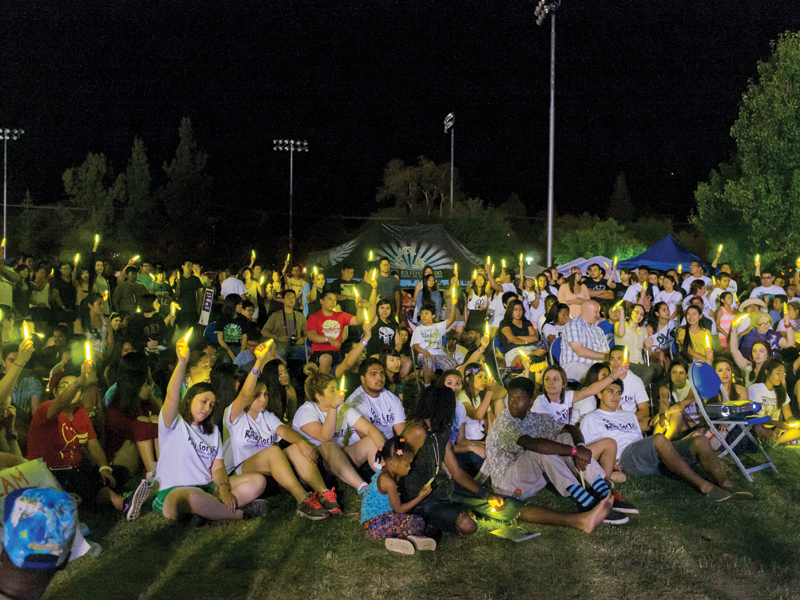
How do you talk about cancer? How do you talk about the disease that caused 8.2 million deaths in 2012, that causes the second-highest number of deaths in the United States, that will cause 75 people to die in the five minutes it takes to read this article? How?
You don’t dwell on death. You celebrate life.
That is how the Relay for Life at UCR talks about cancer. From Friday to Saturday, the UCR community transforms a patch of decaying grass into a fountain of color, hope and life. At the event, attendees from each of the 42 teams, from Circle K to Beta Phi Delta, are a torrent of movement, pledging to carry a baton for 24 straight hours in a symbol of the never-ending battle against cancer and in honor of those who came before. Runners jog, sprint, gallop forward — gripping the baton of hope and keeping it alight. As time passes, the pace slackens. The breaths grow more ragged. The baton-carriers stoop low and pant, exhausted, their inner flame dwindling to a pale glow.
Then a teammate’s hand reaches out. And the torch is passed to the next runner, who carries the hope of defeating cancer ever onward.
“It’s not you yourself. It’s a community,” says Tim Willette, who works at UCR in business and administrative services. “It’s not just about one person, it’s about all of us. We’re drawn together for a common goal.” He’s walking on behalf of the UCR Staff Assembly with his relay partner Robert Wolfer. Both were at the relay last year, and Tim walked all 24 hours. That’s 71 more miles on the road to defeating cancer.
It truly is a community event. A couple jogs the track together, laughing at each other’s jokes. A small group of people in Circle K T-shirts are engaged in a frenzied conversation, their hands gesticulating furiously as they trot around the track. Even Tim and Robert are not alone — Robert’s parents, Peggy and Jim, walk a handful of laps alongside their son. And as mothers are wont to do, Peggy made sure her son had plenty to eat, handing him a sandwich before the steadfast duo continue on their way.
The relay was nearly a year in the making. Jacqueline Nazarian, a fourth-year neuroscience major who is also the team recruitment chair for UCR’s Relay for Life, confesses that “it wasn’t easy.” People who had helmed the project previously had graduated; committee members needed to find new business partners to supply donations. At one point, only 10 people were even working on making the event a reality.
It was hard to tell that from the sea of people and E-Z Ups. If you took an aerial picture of the event, you might confuse it for the top of an open box of crayons. Over 300 people signed up to participate, even though it was a Friday so close to the end of the year, when students are more inclined to hole up in their rooms than go outside and volunteer.
As the Bell Tower chimed six in the distance, a trickle of purple-shirted cancer survivors led a march around the field. Onlookers clapped and cheered as the entourage passed by, before they joined the group too, swelling it to the size of a mighty river. The thermometer soared above 100 degrees Fahrenheit and the harsh sun beat down, threatening to pound the relayers into submission. But the survivors weren’t fazed. The community of supporters was all the air conditioning they needed. They had beaten cancer — let the sun try.
At first, the whole event seemed somewhat quixotic. In the face of something so deadly, how could supporters be so energetic? So hopeful? So happy? “You want to do what you can to help, even if it’s just a little bit,” said Gabriel Macario, a fifth-year computational mathematics major who attended with Katipunan. “It’s really easy to get discouraged and I wanted to help.” Leanne Santos, his running partner, agreed. “Any little bit can change,” she affirmed. It’s this overwhelming desire to make change, and firm belief that a cure can be found that drives the participants to run for 24 hours. It’s why there is so much hope.
But as in any fight, there are losses. With the sun setting behind the cityscape and the cheers of UCR baseball fans fading into the night, a somber atmosphere envelops the field as the relayers drew together to remember those who lost their battles with cancer. In the jet black night, volunteers flit through the crowd, handing out glowsticks to people, as cancer survivor Cori Knight calls for people to light their glowsticks if they lost someone to cancer. There is an eruption of cracking and popping, and the glow of remembrance illuminates the solemn faces as bright as day.
The forlorn sound of a bagpipe emerges. Mike Terry is the one playing, and the dirge is an ode to the fallen — and his wife. The notes hang in the air, and as they slowly fade, the crowd is given the opportunity to speak of their own experiences. Turn by turn, speakers ascend the stage.
A promise: “To see her fall in front of me crying — killed me from the inside. It’s about trying to fight for a cure. It’s about making sure that nobody’s glowstick is lit.”
A lament: “There’s nothing I can do to help her. To make her hair come back. To cure this horrible disease. So I relay for her. And for anybody who’s currently fighting it.”
An affirmation: “Every day I pick school over treatment, I’m taking a risk. My education is important to me. I never want someone else to feel alone.”
As the lights came on, it is clear the tumorous hand of cancer has touched the face of everyone in attendance. And yet, there is strength in their sadness. The lyrics of “Long Live the Queen” by Frank Turner float through the air.
“You’ll live to dance another day,” as students grip each other’s shoulders. “It’s just now you’ll have to dance for the two of us,” and eyes fill with tears as people share a group hug. “So stop looking damned depressed,” and a person presents another with a single rose. “Sing with all your heart” — and the baton is passed.








